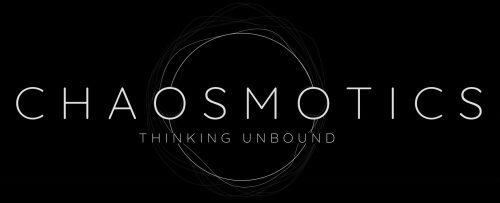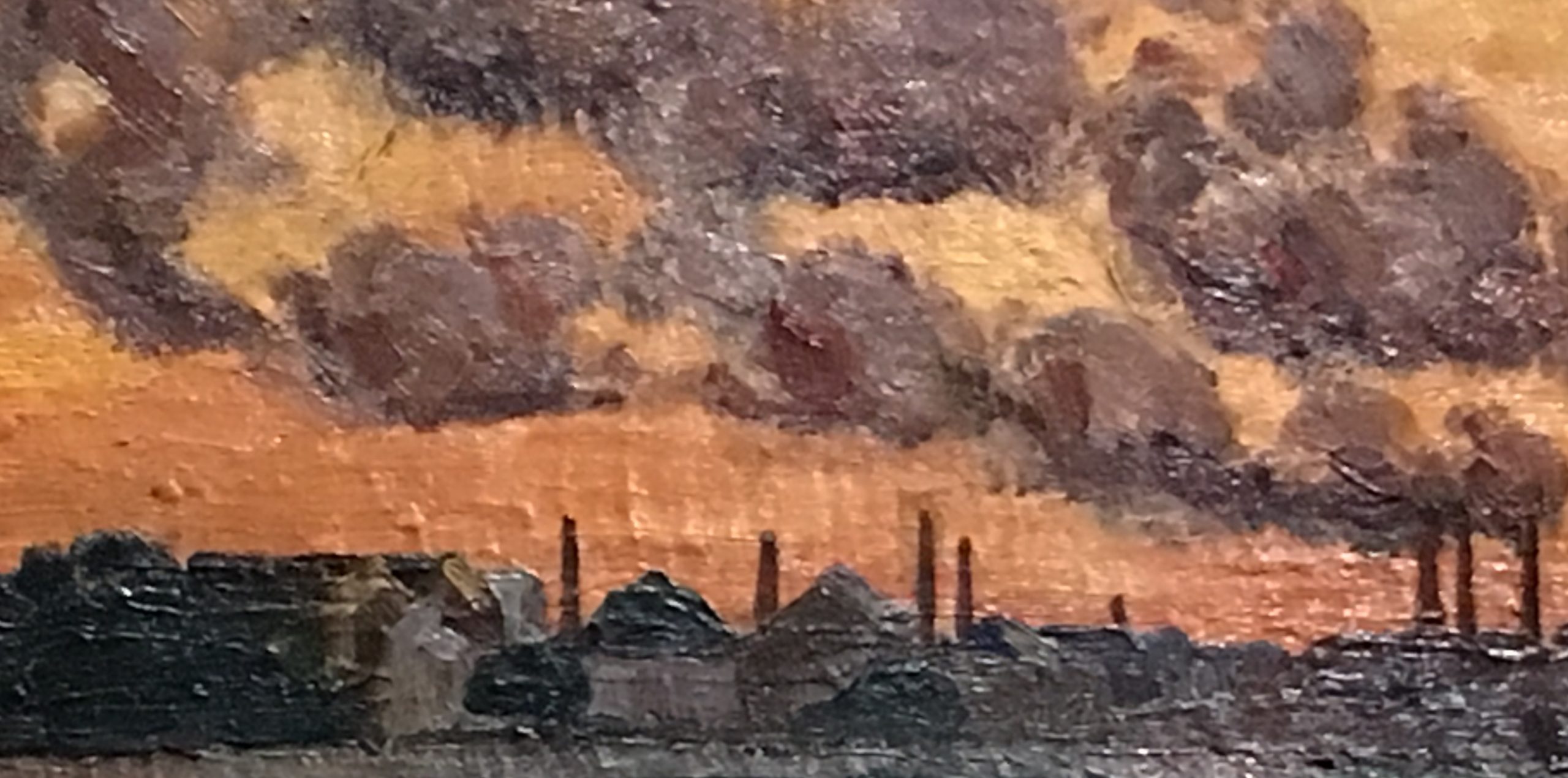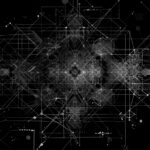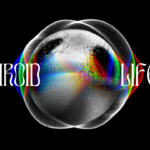The new defines itself in response to what is already established; at the same time, the established has to reconfigure itself in response to the new. Eliot’s claim was that the exhaustion of the future does not even leave us with the past. Tradition counts for nothing when it is no longer contested and modified. A culture that is merely preserved is no culture at all.
– Mark Fisher, Capitalist Realism
1.
The term “chaosmos” was originally coined by James Joyce in Finnegans Wake, referencing a “chaosmos of Alle” amid a winding passage on the convoluted interconnectedness of beings in the flux of the unfolding world, and was further expanded upon thematically by Umberto Eco. It is afterwards taken up by Gilles Deleuze (and later by Felix Guattari), who used it to describe a chaotic world of incompossibility and divergence, a world of dissonance that endlessly unfolds into divergent series out of events of bifurcation. This portmanteau of χάος and κόσμος, then, refers to the tension in which differences, such as order and disorder, compose a single flux. The tendency to stretch traditional metaphysical discourses systematically, culminating in Nietzsche, has intensified such a process and, as a result, has opened consistent questions regarding the meaning and value of western beliefs. Nihilism has affirmed itself as the condition of postmodernity. Within a field of increasingly complex relations, of which contemporaneity is a witness, opposites can no longer be defined. There is, consequently, no space for thinking absolutes, but only the symbiosis of the divergents. The sense is a hybrid, a chiasm; the world an inevitable field of intermittencies and convergences.
The idea of adopting this term for this online publishing platform is based upon a programmatic choice. Chaosmotics is conceived as a gesture; the gesture of sieving the core of this symbiotic complexity. Thinking complexity from the very source of thinking itself, alongside all its distortions. This choice, moreover, seeks to avoid that thought itself becomes a sterile element at the service of the norm. Pushing κόσμος at the edge of χάος, always oriented towards the outside of the whole, beyond the threshold of the unsustainable reassurance that ordinative structures try to give us. This is an inhuman effort.
Today, critical and philosophical discourse unfolds in the strict economy of professionalization: both the genuine and painful capacity of questioning is increasingly vanishing and ceding to impotent hysterics and bureaucratic paperwork. From writing in blood to the gears of advertising; from the endless text to the effective, reassuring and always available slogan. Knowledge is commodified and reduced to an element of competences – a technical know-how.
What is supposed to be the philosopher now takes part in the schizophrenic circulation of the market economy with a reputation of a worker, a goods-producer – an employee thrown within the sphere of economic exchange. It is not an accident that some of the most influential thinkers of the 20th Century dealt with the nature and the essence of philosophy – if not with the possibility of its own end. This state of crisis has been and continues to be a crucial point of reflection. If for an Ancient Greek tradition, doing philosophy – understood as a disinterested and contemplative practice – imposed itself spontaneously according to shared consensus, under the gaze of our contemporaries, it is now instead becoming a composed and tired exercise of empty forms. Likewise, thinking itself is occulting one of its hidden elements, which is dysfunctional to the maintenance of the established productive order. The path seems to be constellated with good intentions, but we can judge this trend by its results: the best novelty to be mustered up within the present philosophical landscape is the belonging to a control system.
The desolation of those environments which traditionally offer to philosophy a safe shelter – and the power given by legitimization – moulds figures upon its own criteria, to ensure there is someone who inhabits it. The university-system has completely lost the sense of problematisation and critical tension in public debates. The academy manifests its own symptoms; some thinkers and professors have to be dismissed as a result of this illness. There must be a few survivors of good health. We look for an outside – the arrival of an epidemic.
The role of culture and knowledge is misunderstood – and ideologically so. Ought anyone think about culture and knowledge as a bunch of notions crammed into a brain? Notions are nothing but elements of knowledge; they are useless without a meaning that determines their relations, and without the critical tension that marks their confluence. Without the obscure “movements” that lead one to create problems, ideas, and the new out of these notions, the elementary receptacle cannot be cherished by the light of life.
We are witnessing automatons become fuller and fuller of words and notions, while remaining entirely incapable of understanding the story of, and behind, those words and notions. To make matters worse, academic discourses are apt to embrace those ideas of scientification and technicisms which reduce them all to vapid and insulated chatter. If it is true that, on the one hand, legitimacy stems from rigour, on the other hand, one could point out that philosophical thinking has lost its pedagogical character. It is hard to say where philosophy begins, and also where it ends. But it is not a matter of time and space: it is rather a question of mode. Losing the task of dissemination – of problems, concepts, perspectives – constitutes a higher stage of the malady.
The institutions through which it is presently facilitated, those slowly lapidifying nuclei of “professional” academic production, are the very same vehicle and cause for the demise of philosophy-turned-profession. What do you think will happen when the scheme of exponential lending ends and the student loan bubble bursts, when the universities are suddenly made less-and-less relevant and their tuition-sourced income plummets, when the wells of grants and funds finally dry up (and especially so for those departments which lack the functional performativity to generate and accrue industrial capital)? Attempts at cultivating serious philosophical discourse in new mediums – namely through both mature and nascent conclaves and communities on the internet – have mostly fared no better, plagued with undisciplined amateurity and a profound lack of depth which ensure its very failure from the outset. Philosophy has entered a position and degree of precarity it has not seen since its conception, and (it is not unthinkable hyperbole to say that) there now exist on the horizon trends which threaten to bring it to an end on a permanent basis. What are we to say, to do, when we look forward and see in the haze a future in which philosophy as such no longer exists, except in echoes that resound in degenerated and sightless musings and in its last few silent shepherds of yesteryear? Could philosophy, or what would better be called thinking, at all retain the potential of re-discovering itself in this upended and dissociated state, or would this truly mark its end? And is there anything to do about it now?
2.
Thinking is not human. It is not human in relation to the presupposition that “being-human” already has a meaning. We could see thinking as a projection, a threatening, an analysis, a mixing, a diffusion, a dissemination. Paradoxically, following a certain sedimentation, philosophical thought has been reduced to a mechanics of thought, a useful prosthesis of the production of goods – the “valid”, the “true”, the “denotation” and the “qualified”. Wild thought has been civilly confined outside the city. We continue to exhume the remains of thinkers hoping to find among their dry bones – right there, hidden – a new gaze, new perspectives and answers. We have consecrated the meaning of our intellectual lives to the cults of the person and to a ceaseless and increasingly fruitless exegesis. Thinking has taken the form of a dull, helpless and nauseating carcass that does not have the character it had in life. A question, however, is worth asking: is this really what it is – is this really thinking?
To think outside the box is always and already the depressed gesture of a frustrated incompetent. If, in order to abandon ourselves to the philosophical creation we need a box to get out of, it means that we are just re-projecting our misery on a scapegoat. To atone mediocrity’s sin of feeling ourselves bounded by someone outside. The sin of presupposing and willing the control on things, and to have lost it – even if we have never had it. Philosophy does not go outside the box, because it, of course, is not inside. “To exit” is to create another space in respect to the one we are exiting. “To exit” is to create another time in respect to the moment when we are not already out. “Philosophizing” does not need a time or place. We were aliens before we started to call ourselves terrestrials.
An event, for us, is necessary. Philosophy need to re-establish the connection with the speculative dimension of thought, insofar as we do not confuse it with mere phantasy. It has to regain its divine inutility — the one able to elude the deadly logic of the market. Since its product, be it a concept, an interpretation, a symbol, or an entire system of thought, ought not to be a consumer good. Thinking itself is not subject to the process of consumption. Once it emerges, even in its interaction with the finite world, its essential value goes far beyond every sheer and practical economy. Commodification and communication are parts of the exchange and thereby imply fruition; hence, consumption. However, thought cannot utilise things, and the same holds for the other way around. Contrary to knowledge, it is in movement and thus it always outdistances itself from things, as well as the practice from the impositions, the things from the processes.
If philosophy is something, it is such because it acts as a possibility for everyone, open to everything and thereby naturally ambitious and foolish. Perhaps even unclassifiable. Thinking, and doing it properly, is a task accomplishable by means of a choice, even though such a choice appears as obliged, unconscious and traumatic. It is as such for everyone. Philosophy, in fact, lurks in the improbable and hopeless wastelands of forgotten places where thinking calls – since it has not fixed home, insofar as it abruptly creates its own. Yet, one should not conceive of the movement of thinking as proceeding from its cold highness towards the base and popular milieus: it is not a matter of illumination – there is no light where questions arise. It is, instead, an ascending movement: from wherever it emerges, it tends to elevation, to perspective enlargement.
3.
Chaosmotics is also an attempt of restitution. Of what? “The capacity of feeling terror”, which is the pre-originary condition to thinking. Answering to this – which is not, at the end, wonder – may seem trivial, but we wish to pose the question also at this level of frankness. We have to face complex discourses with direct, simple means, without renouncing to those nuances that complexity offers us. We need clarity and a direction. Questioning affirms a distance, and such a distance produces a direction between what is distanciated and what distances. It produces a movement that is potentially repeatable endlessly, in the repetition of difference. What does this question mean to us? It refers to the source of questioning itself – and this might be called philosophy. As a product of thought, man acts in the forgetfulness of the being of such thought, its ancestral and spontaneous kernel. Man is thought and criss-crossed by anonymous streams, of which he is nothing but an aspect.
The movement of thinking should yield abyssal openness. Chaosmotics seeks to reproduce such a dynamic – in the a-temporality of thinking itself, in its biography. We shall try, then, to wear the winged sandals of Perseo and Hermes, in order to map out our complex contemporary world; its roots, dynamics and unspoken paths we are walking. Our work will also seek to transmit and suggest the will-to-think and the capacity of creating distance in relation to the fights called “reflections upon the events”. This expresses itself as the effort of becoming conscious. Our aim is to embrace ongoing debates and to extract, from events and relations, the logics that guide our routine. This will also be addressed with a constant perspectival movement: from philosophy for philosophy to philosophy for, and with, arts and sciences – and back. With untiringly open jaws, to pick up a loose mesh in the net, between new paths and ancient fears. The path of Chaosmotics would like to be, at the same time, pedagogical. Distance and approach. It represents the effort to become, again, inhuman.
We assume the task of getting closer to the arts, the sciences, the events and languages of the present; we hope to beget useful maps, in order for you – and for us – to explore what we have nonetheless admired from afar. Philosophy is and has to re-attain thinking that travels at the speed of light, and at the end of the night. It is a matter of throwing philosophy again in the wilderness of thinking.
Our field of action wants to be popular, but popular as an uncanny parasite; far from culminating in empty yakking – like the mere chic-chat of the “philosophy of running” or “philosophy of success”, as if the advertising formula “philosophy of” would bestow eloquence and value upon sheer market products – it should always be looking for new paths of knowledge. Chaosmotics should encounter the popular to sieve, shock and disfigure it in order to produce unbearable torsions. Thought can start from “pop” material so that it is immediately disintegrated and disfigured – abandoned to the service of a gamble of thought and praxis.
The imperative of a regulative and normalized production must leave space to the dissolute euphoria of intensities, and thus welcoming the virtual will-to-think. We need to regain the ability to focus on imagining. Therefore, Chaosmotics represents itself as a possibility: the possibility that our circumstances can be advised of the occlusive trend they are keen on embracing. The possibility that thought ties itself up with madness; that they find, together, a new synthesis, in a perennial movement from the source of the river to the mouth – and back. It embodies an attempt to emancipate philosophy from the ideological barriers casted upon it, and to focus on the gaze on the surface folds, while the evolutions of the surface itself are seen too. Outside ivory towers. For-us, there comes the necessity of an again in order to establish a radically new.
We cannot face this time of crisis alone; it is unreal, presumptuous, arrogant. The path we have in mind would be devoid of sense if we do not expect to take part in a collective effort to grow, of an imaginative, artistic frenzy that has as its core not a current, a form, a structure, but the strength and will to embrace all currents, forms, structures. The perspective of many is a new road, it is more than the sum of individual units. Not only a sun had set for us. Our faith is tied up with new and unpredictable visions of the future.
Posing a question. Waiting for the answer (?).







